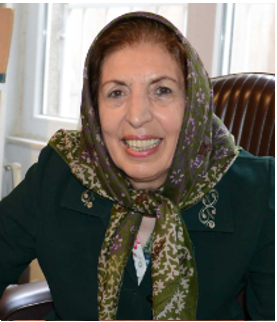Recipient of the Nowruz Award from the Pasargad Heritage Foundation, year 1403 of the Iranian Calendar (2024) –
In the field of Cultural Heritage:
Dr. Jaleh Amouzgar is a researcher of ancient Iranian culture and languages, a historian, translator, and university professor. She is this year’s recipient of the Nowruz Award in field of Cultural Heritage for her achievements as outlined below:
-
- More than forty years of research and teaching Iranian culture, literature, history, and language.
-
- An impressive lifetime of efforts to preserve and promote the cultural and historical heritage of Iran.
-
- Tireless efforts to learn the ancient languages of Iran to read from important historical texts.
-
- Valuable services in the identification of Pahlavi texts and Iranian myths.
-
- Authoring of more than ten books and articles about Iran’s ancient culture and history.
Jaleh Amouzgar Bio
Jaleh Amouzgar was born in December 1939 in Khoy, Iran. She obtained a five-year scientific diploma from Irandokht Highschool in Khoy and a six-year diploma in Tabriz. To continue her studies, she joined the Faculty of Letters and Humanities at the University of Tabriz. As a top student in literature at university, she was awarded a scholarship, as many of the best students were awarded at that time. However, she was unable to benefit from the scholarship as her traditional family did not wish for her to travel abroad alone.
She was married and worked as a teacher in 1964 when the Ministry of Culture later announced that top students who did not initially use their award could reopen their cases. With this, she went to France and continued studying at Sorbonne University, now accompanied by her husband and daughter. Her PhD. dissertation is about Zoroastrian literature in the Persian language, including Zoroastrian writings and texts, which were written after Islam came to Persia but were according to Zoroastrian tradition. She graduated with her PhD and returned to Iran in 1969. She then worked at the Iranian Culture Foundation from the Ministry of Education. In the time, there were not any authentic Persian resources about Iranistics. However, she and other scholars, such as Mehrdad Bahar, Mohsen Abul-Qasemi, Fereydun Vahman, and Mohammed Salim, each started to study one Pahlavi book and wrote a glossary under the supervision of Parviz Khanlari. After two years, she worked as a professor at the University of Tehran. Regarding her studying days and university, she said, “I believed that we do not learn many things when we study, and it is the years later that one become familiar with the essence of working and knowledge.” To her, studentship is just the beginning, and one simply acquires knowledge of the methods of learning. It is just the beginning and not the end when someone acquires their PhD, and one feels before that that their works were immature.
Amouzgar has many works and texts which can be categorized into books, translations, and essays. She wrote Zoroastrian Myth of Life (with the collaboration of the late Ahmad Tafazzoli), Pahlavi Language, Literature, and Instructions, and Mythological History of Iran. As a translator, she translated the Book of Arda Viraf, as well as The actions of the kings in the traditions of ancient Iran, again in collaboration with Ahmad Tafazzoli.
















